The Annual Meeting, hosted by Idaho Gov. Brad Little, included conversations with regional experts on wildfire, drought, cybersecurity, and the supply chain.
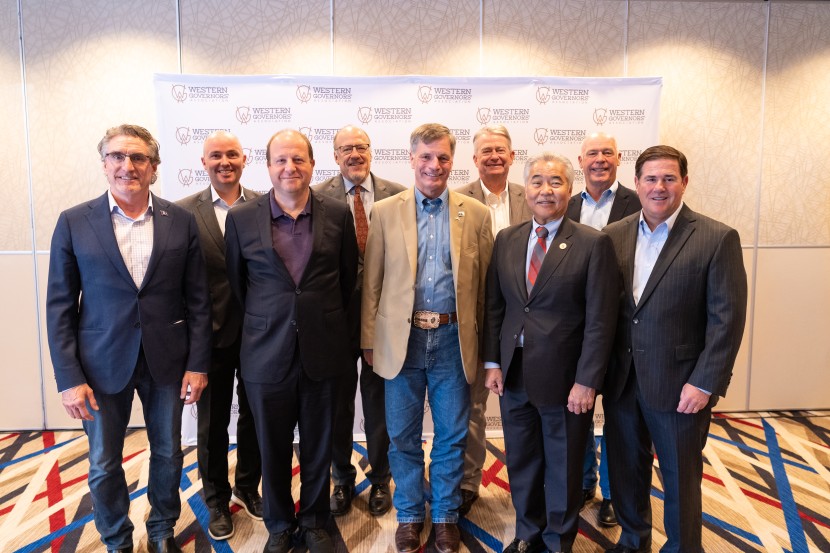
Whether it was wildfire mitigation and restoration, mental and behavioral health care, or cybersecurity and the supply chain, bipartisanship and a willingness to work across state lines was the theme that permeated nearly every conversation at WGA’s 2022 Annual Meeting in Coeur d'Alene, Idaho.
“Effective partnerships and collaboration… are indicative of how we work to resolve problems in the West,” Idaho Gov. Brad Little, the host of this year's Annual Meeting, said in his opening statements. “Today, we’re seeing the evidence of the incredible progress we’re making of getting more work done on the ground level.”
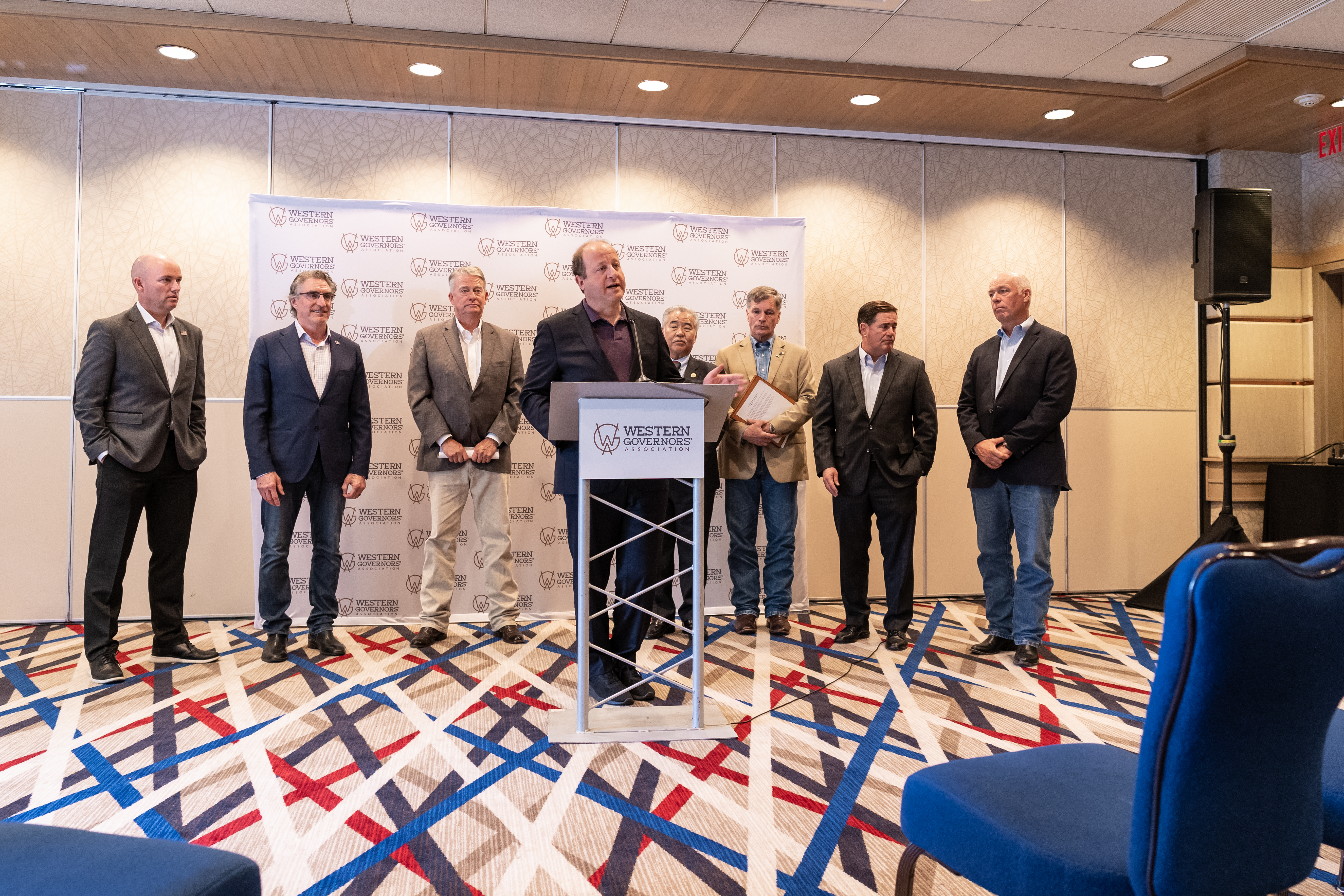 Building upon the successful bipartisan work of Gov. Little's WGA Chair Initiative, WorkingLands, Working Communities, Colorado Gov. Jared Polis, the newly elected Chair of the Western Governors' Association, announced his WGA Chair Initiative – The Heat Beneath Our Feet – which is designed to jump-start the development of geothermal energy generation.
Building upon the successful bipartisan work of Gov. Little's WGA Chair Initiative, WorkingLands, Working Communities, Colorado Gov. Jared Polis, the newly elected Chair of the Western Governors' Association, announced his WGA Chair Initiative – The Heat Beneath Our Feet – which is designed to jump-start the development of geothermal energy generation.
“Geothermal energy is an opportunity to save people money, boost local economies, and help us achieve 100% renewable energy in Colorado by 2040,” Gov Polis said. “I look forward to making progress towards clean, lower-cost power through the Heat Beneath Our Feet initiative and the strong bipartisan partnership of the WGA that will lead geothermal energy innovation.”
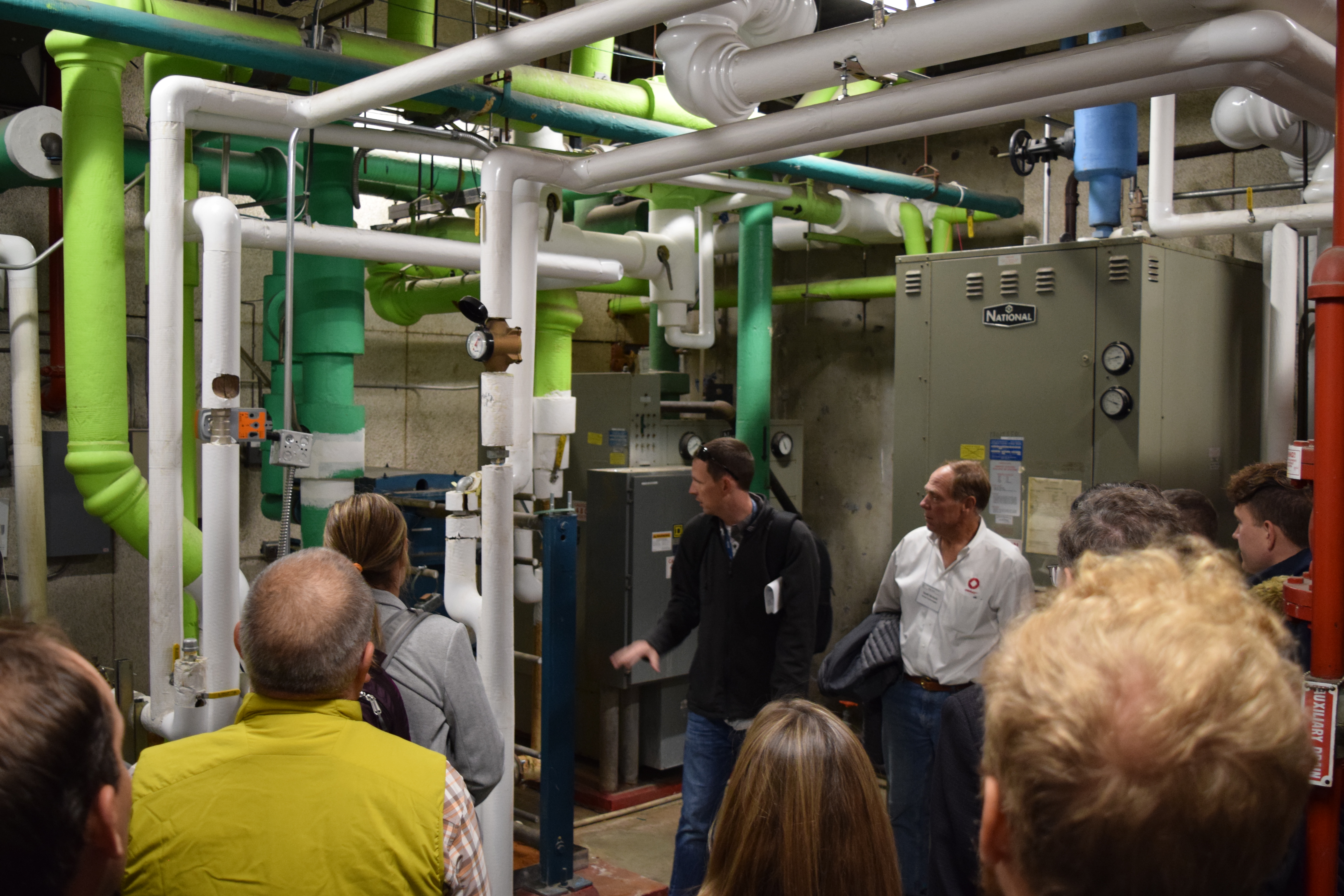
“Congress needs to continue to appropriate the resources to allow us to work with the states in partnership to implement that plan," he said. "President Biden has tasked us with making sure that we strengthen our relationship with governors and there is no better place to do that than with the Western Governors’ Association and the Governors here today.”
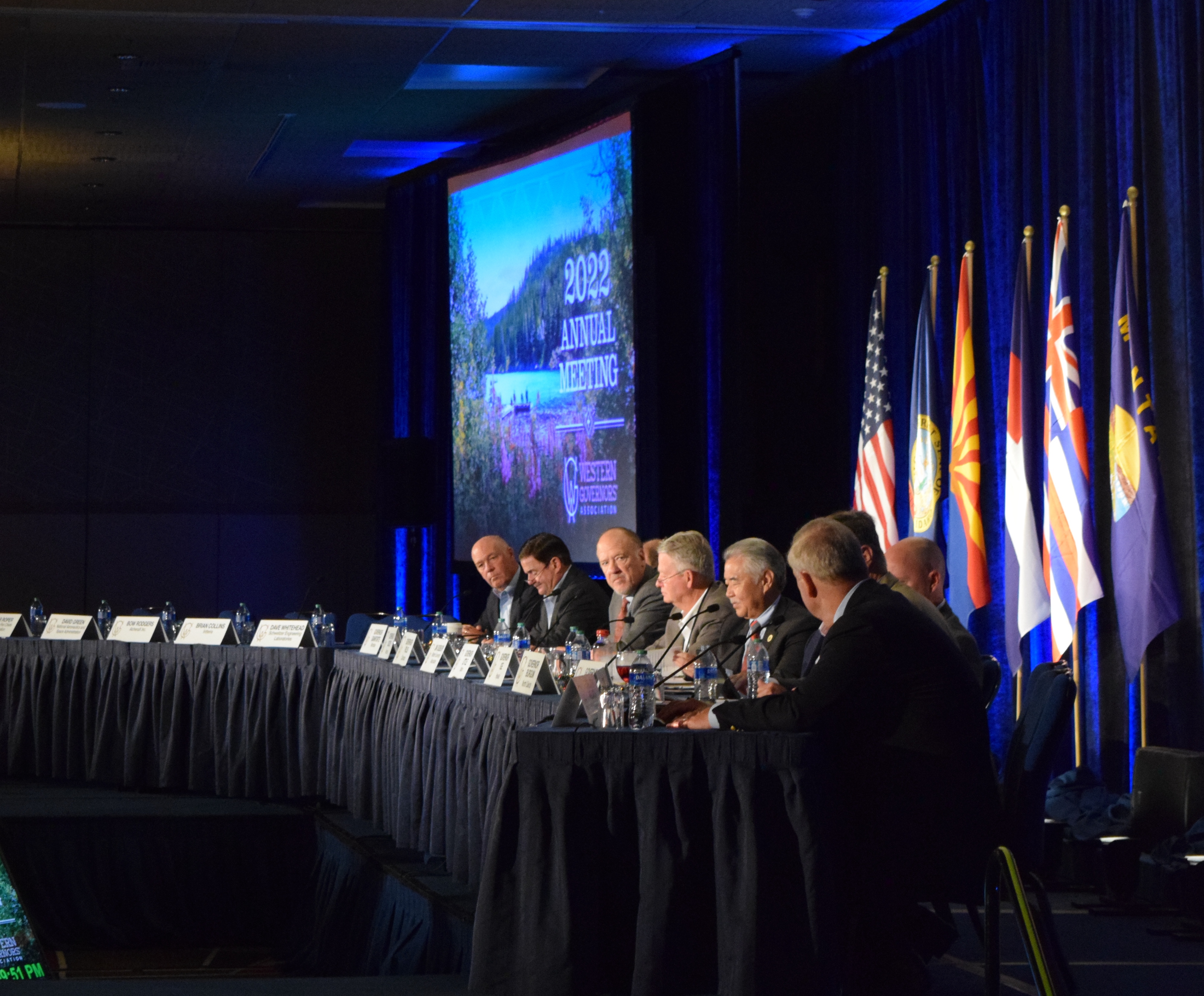
“Whether we’re talking about the issue of COVID or the issue of behavioral health,” he said, “there is a clear sweet spot where we can do a lot of work with our Governors and even more locally, with our Mayors, Supervisors, and Alderman.”
Following the keynote addresses from Sec. Vilsack and Sec. Becerra, and their subsequent discussions with the governors, panels of regional experts sat down with the Governors to explore new technology capable of detecting wildfires and cybersecurity.
Get more highlights below.
July 26
Keynote I: Secretary of Agriculture Tom Vilsack
Sec. Vilsack: “We owe it to the Western Governors and those who work and raise their families in the western part of the United States to do what we can to reduce the risk of catastrophic fires,” he said. “That requires us to have a strategy, requires us to have resources to implement that strategy, to reduce the hazardous fuel buildup, so that at the end of the day we’re in a better position to avoid the loss of life, to avoid the loss of property, and to provide greater opportunities for those who enjoy our forests.”
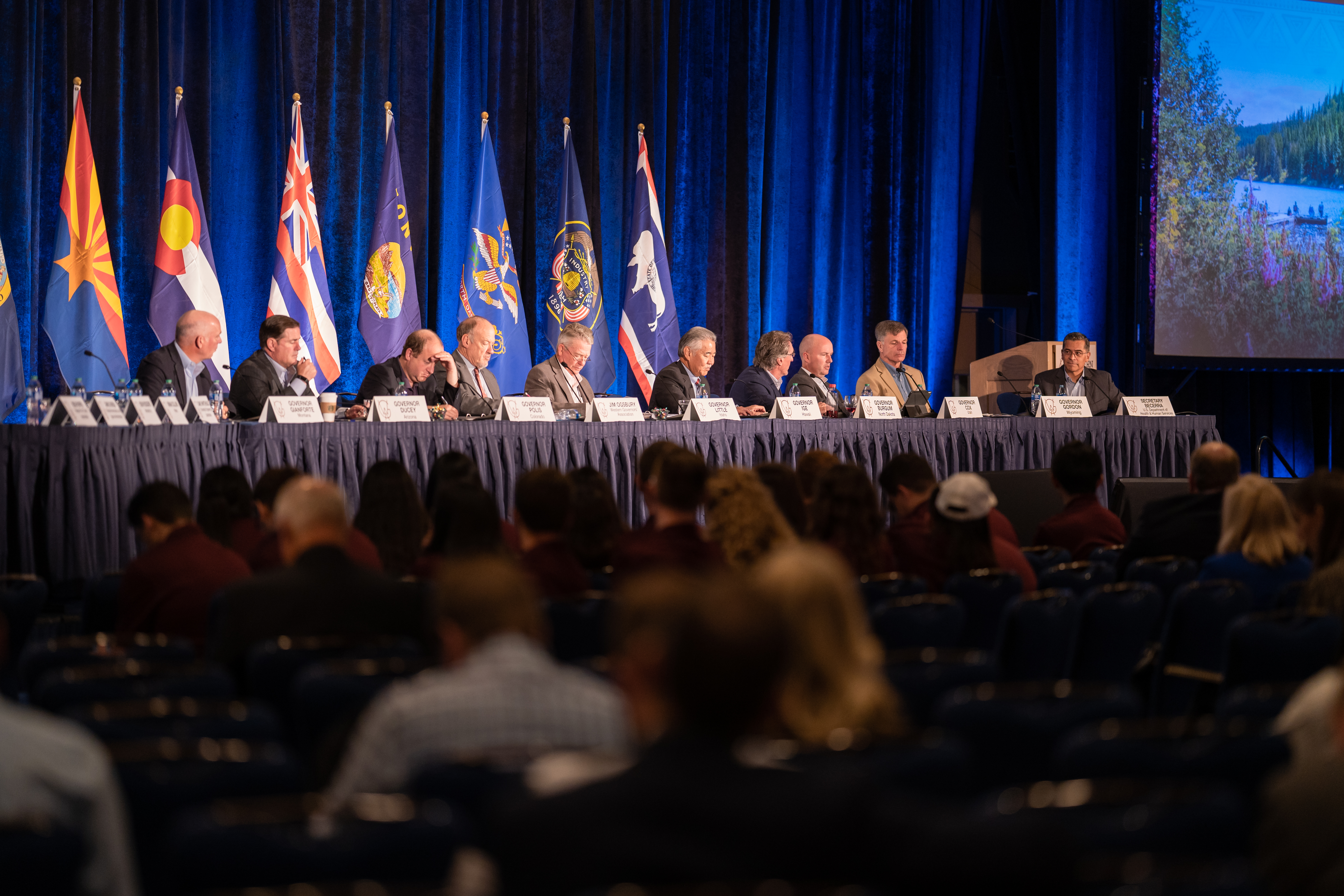 Keynote II: Secretary of Health and Human Services Xavier Becerra:
Keynote II: Secretary of Health and Human Services Xavier Becerra:
Sec. Becerra: “One of the areas I hope that we continue to work together on is the recently launched three-digit national suicide prevention lifeline that is now in place as of July 16,” he said. “Some people think it’s a federally run operation. It is not, it is run by the states and their local governments along with community entities that have taken on the task of being the call centers, the tribal governments have their call centers sites as well, as do some of the territorial governments. As the federal government, we serve as the glue to bring all these different networks together to work as one.”
Roundtable I: Sensing the Wildfire Threat
Brian Collins, Chief Executive Officer of Intterra: “The crux of tech is communities collect the data, but don’t share that data, and don’t have a place to share mitigation. Some communities might complete the same fire mitigation project. Data sharing is essential.”
Chief Bob Roper, Senior Policy Advisor for Western Fire Chiefs Association: “Technology can assist in addressing the 'true costs' of wildfire,” he said. “Really the true cost of a fire is life, property, environment, economics, jobs and when a community burns down you lose your tax base.”
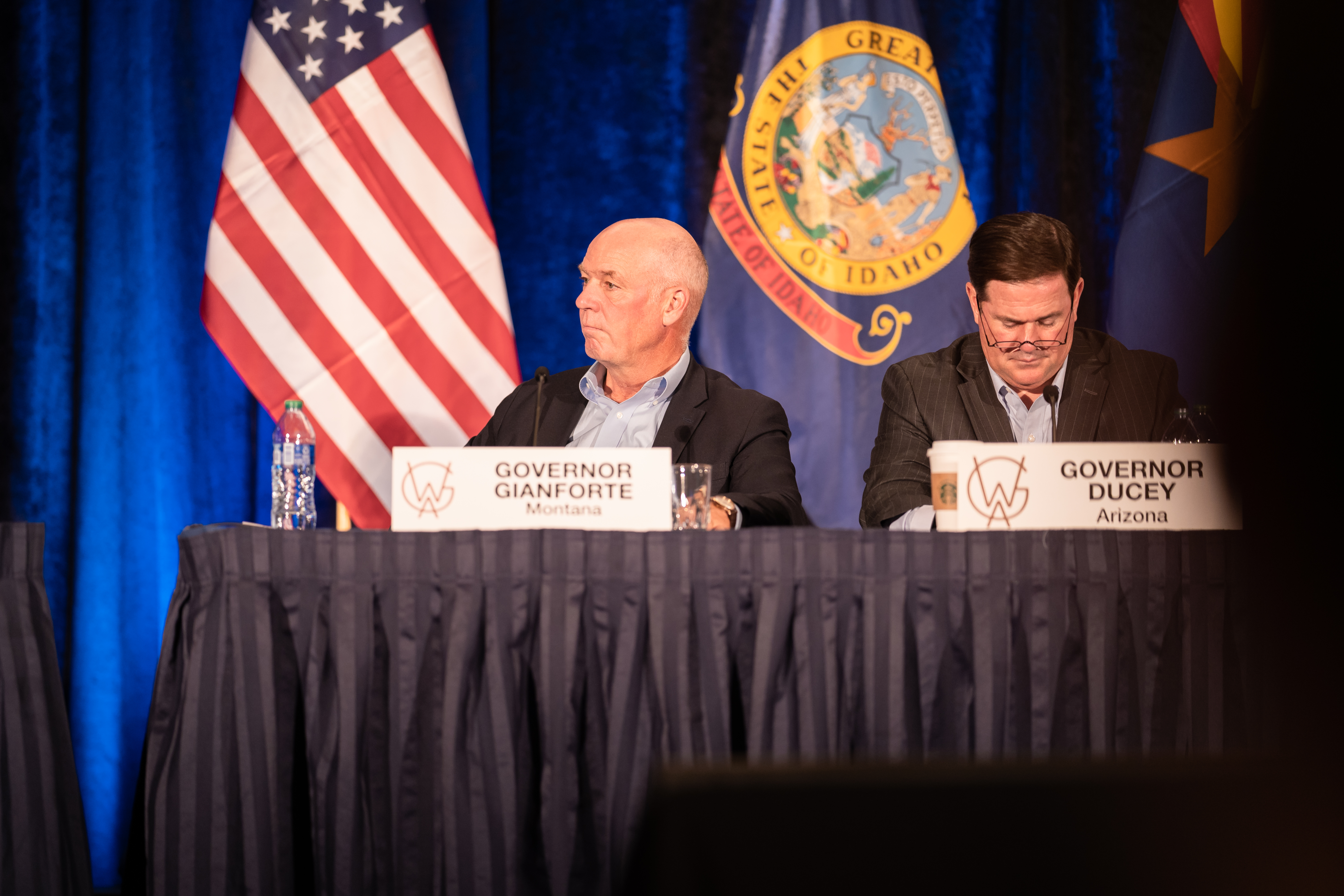 Roundtable II: Utility Cybersecurity Threats
Roundtable II: Utility Cybersecurity Threats
North Dakota Gov. Doug Burgum, “The cybersecurity threat is not just a theoretical concept,” he said. “There is a moral and financial responsibility to protect data at the state level… States are stakeholders in protecting every aspect of a person's life from a data standpoint.”
Carla Heathman, Senior Power Systems Engineer for Idaho National Laboratory: “Our critical infrastructure is older now, and we weren’t designed for these kinds of cyber security threats,” she said. “We need a strong partnership between the private sector and government so we can make our programs a better fit to address what is out there in the field.”
Duane Highley, CEO, Tri-State Generation and Transmission Association: “Electric Utilities and Water Utilities are on the front lines of international warfare,” he said. “Two thousand municipalities do not have cyber and IT capacities… We have an enormous opportunity before us to utilize the private and public partnership.”
Jason Hoyt, Operational Technologies Manager for Central Utah Water Conservancy District: “Some of these water utilities only have two people (staffers), and most of them don't have any knowledge of computers,” he said. “There are a lot of resources out there, but these smaller utilities need help.”
July 27
Keynote: Secretary of Veterans Affairs Denis McDonough
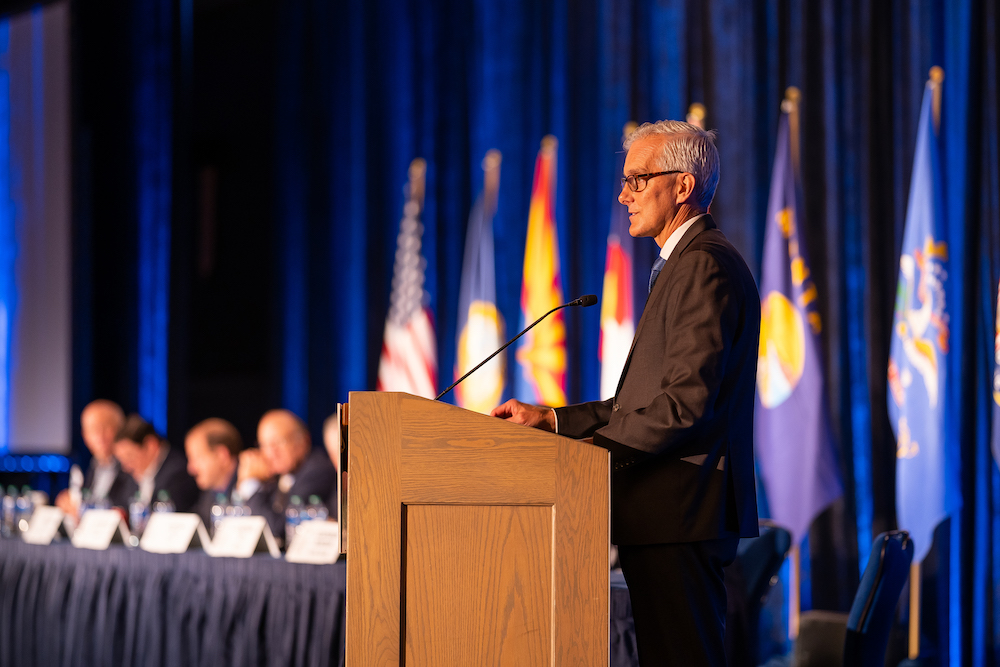 Sec. McDonough: “We’ve fundamentally remade our presumptive decision-making process, putting one goal above all else: getting vets the timely access to the benefits that they’ve earned,” he said. “We want the Governors to be a part of this process, we need the Governors to be part of this process and I promise we’re going to get them world class care.”
Sec. McDonough: “We’ve fundamentally remade our presumptive decision-making process, putting one goal above all else: getting vets the timely access to the benefits that they’ve earned,” he said. “We want the Governors to be a part of this process, we need the Governors to be part of this process and I promise we’re going to get them world class care.”
Roundtable III: Protecting the Links
Augusto Bassanini, President and Chief Executive Officer, United Grain Corporation: “For us to continue to see a reliable supply chain, we need infrastructure investment,” he said.
Matt Clark, Senior Industry Analyst, American AgCredit: “What I would encourage here and where I think the sweet spot is for all of us, is coordination,” he said. “It’s unacceptable to be just a lender of money in this industry… whether it’s helping them understand where their processors are going, or where the pinch points are… I would encourage that integration going forward.”
Roundtable IV: Restoring Burned Landscapes
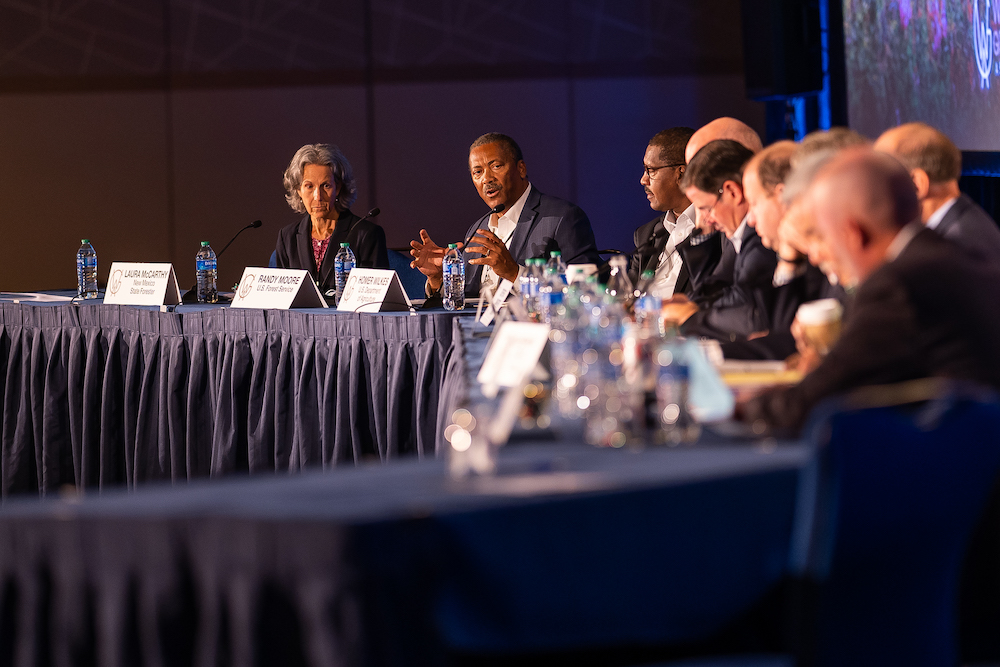 Utah Gov. Spencer Cox: “I want to underscore and highlight that certainty [of timber supply and long-term agreements] is important to all of the western governors.”
Utah Gov. Spencer Cox: “I want to underscore and highlight that certainty [of timber supply and long-term agreements] is important to all of the western governors.”
Laura McCarthy, State Forester, State of New Mexico: “The ratio of burned lands to green lands is increasing, and that’s a problem for all of us. I appreciate that the Working Lands, Working Communities Initiative has given us a roadmap that urges all of us to action,” she said. “We are united across the west in the commitment to scaling up the restoration work. If we don’t, we are going to lose our forests.”
Randy Moore, Chief, U.S. Forest Service, U.S. Department of Agriculture: “Million-acre fires are becoming more common, fire seasons are turning into fire years, and our tools and teams just aren't designed for this scale of work. We need to scale up in order to meet the change in conditions we see now,” he said. “There is nothing that would please me more than seeing longer-term agreements for restoration.”
Homer Wilkes, Under Secretary for Natural Resources and Environment, US Department of Agriculture: “Fire doesn't know boundaries, so we have to make sure we address the resource concern after a fire,” he said. “The tool that’s most utilized for that is the Good Neighbor Authority.”
July 28
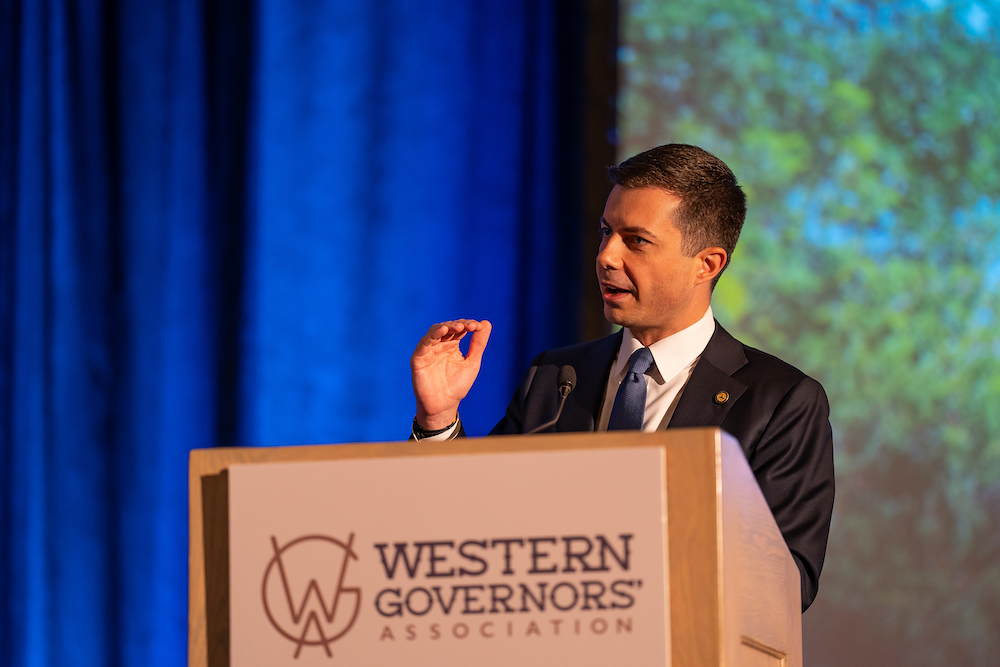 Keynote: Secretary of Transportation Pete Buttigieg
Keynote: Secretary of Transportation Pete Buttigieg
Sec. Buttigieg: “I think you have a chance in the West to challenge some expectations about where innovation happens because so much of it is happening in your states.”
Roundtable V: Drought in Western States
Michael L. Connor, Assistant Secretary of the Army (Civil Works), U.S. Department of the Army: “The overall objective of our effort is to educate ourselves as well as other agencies, states, and local communities as to how we can work with them.”
Morgan Gratz-Weiser, Deputy Natural Resources Policy Advisor and Legislative Coordinator, Oregon Governor Kate Brown: “Regional water planning is a very hot topic, we know that each of our basins are unique, to make communities resilient we need to be bringing people together to make new plans for each basin.”
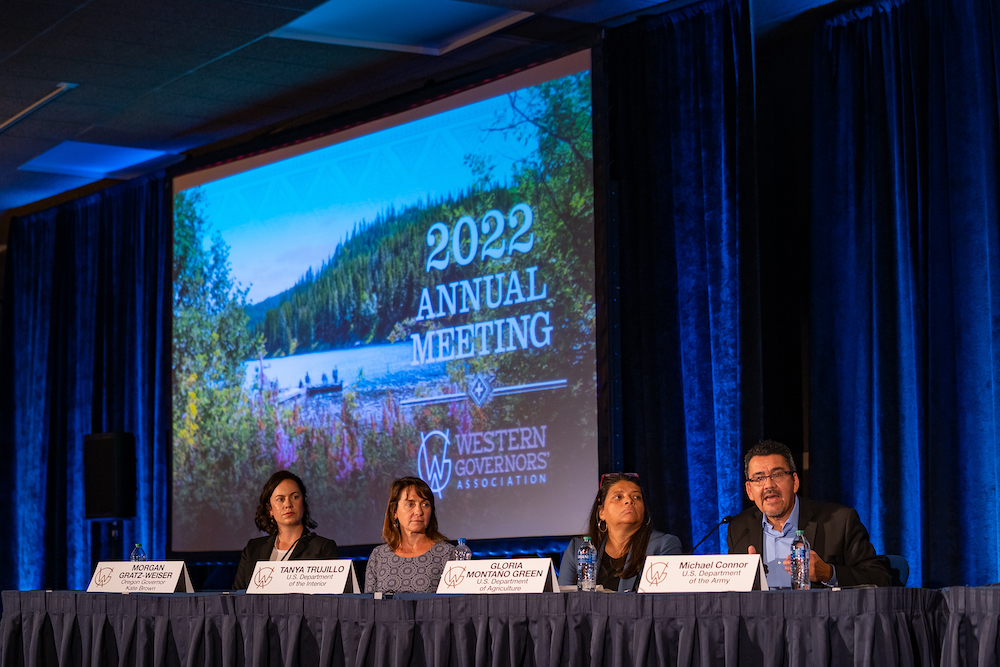 Gloria Montaño Greene, Deputy Under Secretary for Farm Production and Conservation, U.S. Department of Agriculture: “There is a demand and need to provide resources to farmers and ranchers in the riskiest business as they adapt and modify [to drought conditions].”
Gloria Montaño Greene, Deputy Under Secretary for Farm Production and Conservation, U.S. Department of Agriculture: “There is a demand and need to provide resources to farmers and ranchers in the riskiest business as they adapt and modify [to drought conditions].”
Tanya Trujillo, Assistant Secretary for Water and Science, U.S. Department of the Interior: “We are literally operating under circumstances that our engineers have never seen before, that is the precise challenge we are facing in western states”
Roundtable VI: Western Governors’ Leadership Institute
Hawaii Gov. David Ige: “I truly believe that in 25 years from now, we will be talking about the hundreds of Western Governors’ Leadership Institute alumni who will be leaders in the region.”
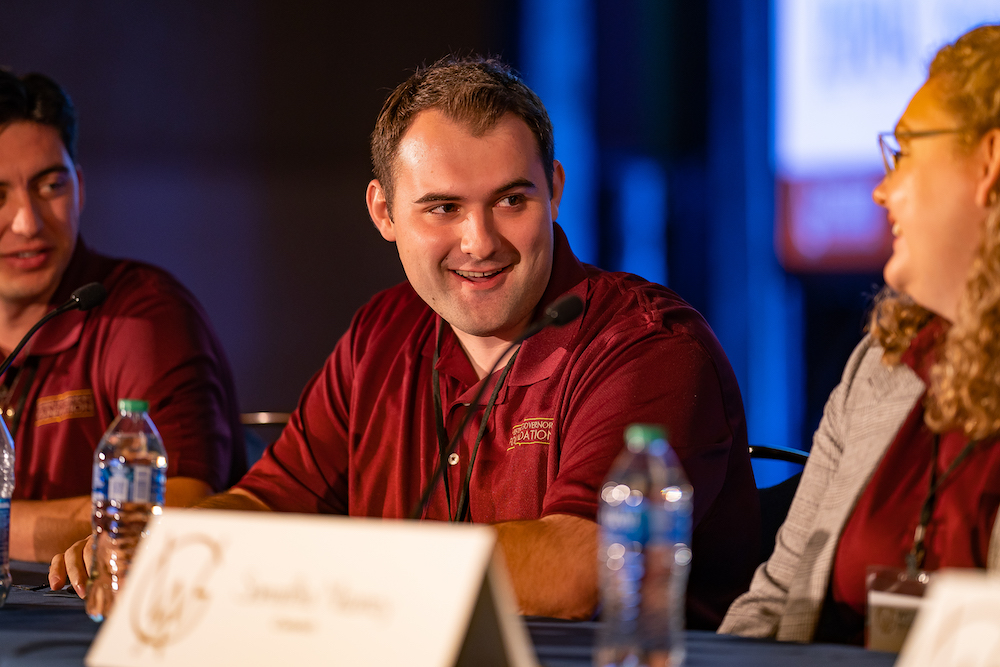 Arizona Gov. Doug Ducey: “It is so impressive to see so many young people engaged in these issues.”
Arizona Gov. Doug Ducey: “It is so impressive to see so many young people engaged in these issues.”
Colorado Delegate Samantha Mooney: “This has been a really unique opportunity to dive deep into issues and learn what it takes to get things done.”
New Mexico Delegate Brandon Larranaga: “We couldn’t have asked for more or better opportunities to meet people and network with Governors and former Governors and sponsors and each other.”
Closing Remarks
Colorado Gov. Jared Polis: “More and more it is states on the front lines on these issues,” he said. “I look forward to working with my fellow Governors on these important efforts over the next year.”